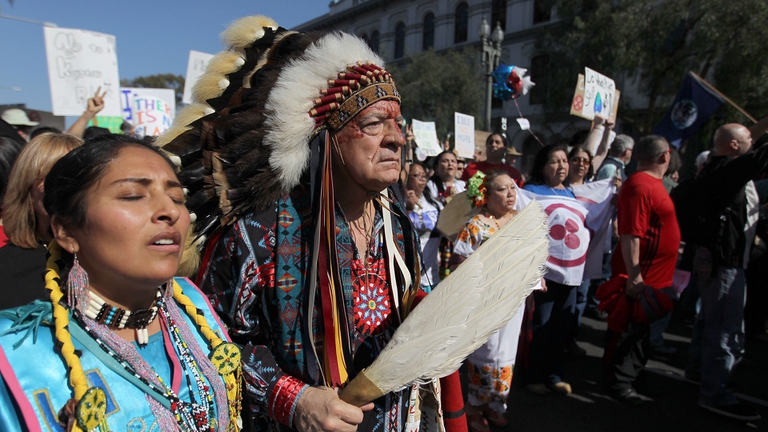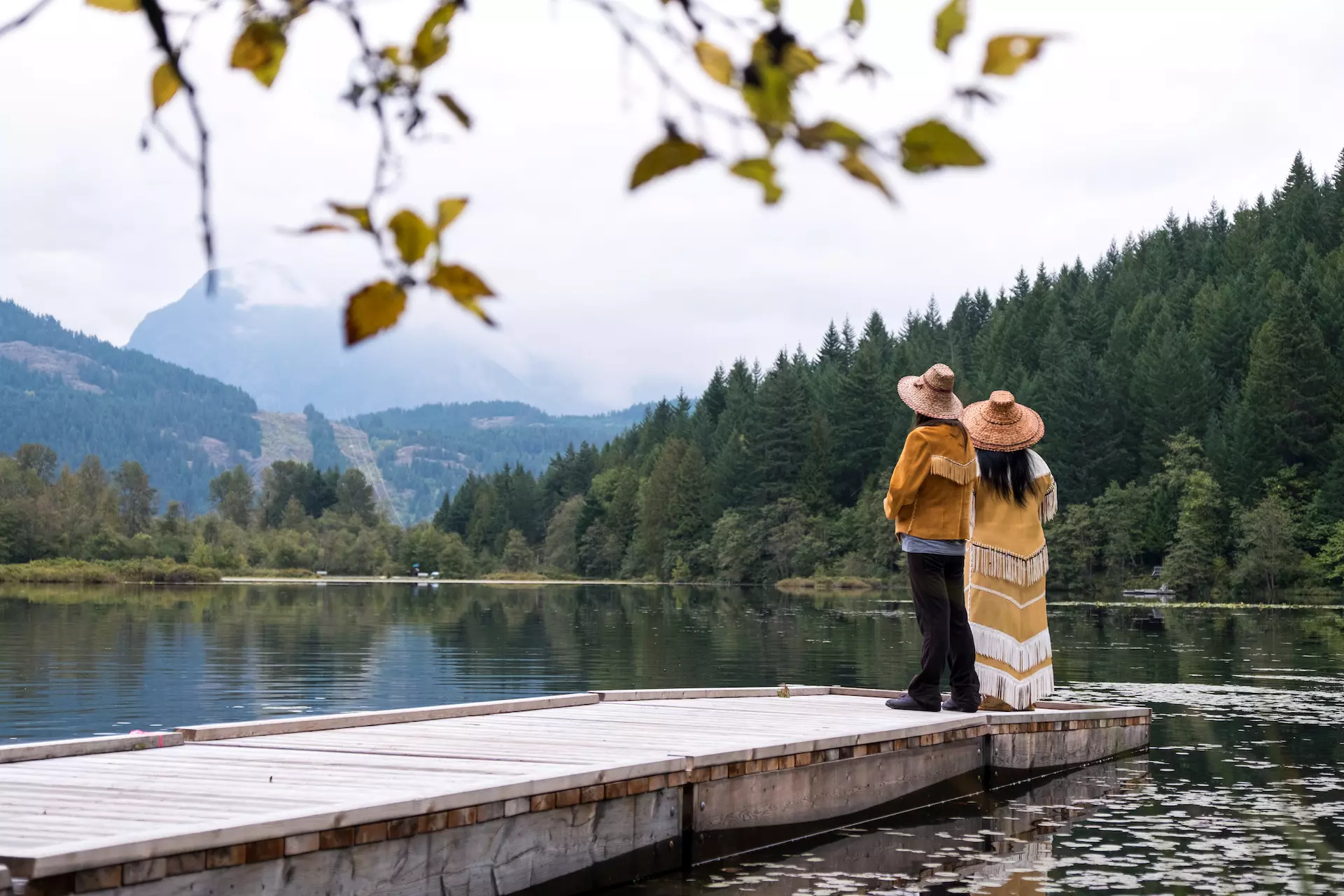
Autumn Peltier is a water defender who began her fight for indigenous Canadians’ right to clean drinking water when she was only eight years old.
A new marine protected area will be created in Canada thanks to indigenous campaigners, because protecting native land means protecting the environment.
Almost a decade has passed since political leaders, environmental activists, and indigenous peoples in Canada reached an agreement to protect the vast, 6.4-million-hectare area known as the Great Bear Rainforest. Home to centuries-old cedar and spruce trees, as well as wolves, salmon, and grizzly bears, the uncontaminated reserve on the Pacific Coast of British Columbia is as large as the whole of Ireland. Now, indigenous peoples in the same region hope to replicate that success by extending the same type of agreement to the ocean and finally creating a new Marine Protected Area (MPA) called the Great Bear Sea.
During the Fifth International Marine Protected Areas Congress (IMPAC5), which was held in Vancouver, the leaders of the main First Nations in British Columbia – Canada’s westernmost province – announced a plan to protect a 10-million-hectare strip of sea coast, extending from Vancouver Island to the border between Canada and Alaska.
The region is home to 26 First Nations who protect six ancient languages from going extinct. Protecting the forest, however, is not enough: in recent years, stocks of wild salmon in the Pacific, a key species for the survival of coastal communities, have plummeted, as have those of eulachon, Dungeness crab, and scorpionfish.
However, things are destined to change as 15 First Nations, alongside the governments of Canada and British Columbia, signed off on the Network Action Plan for the establishment of a MAP in what will officially be known as the Northern Shelf Bioregion (NSB). One of the first tasks will be to define costs and a timeline, given that they are currently still uncertain.
“First Nations on the Pacific North Coast have been stewards of the lands and waters for more than 14,000 years and are deeply committed to protecting the rich diversity of marine life as well as traditional practices and wellbeing, while supporting a healthy local economy for all,” the initiative’s official press release reads. “The Government of Canada is working with First Nations, the Province of British Columbia and partners to conserve 25 per cent of Canada’s oceans by 2025 and 30 per cent by 2030. This collaboratively developed Action Plan is a meaningful contribution to achieving these goals and targets.”
In recent years, BC intensified its imports and exports of wood pellets and liquefied natural gas (LNG). However, marine biologists agree that supporting the repopulation of fish species would be a key contribution to the fight against climate change. By setting up a network of protected areas, the hope is that the reason might see rapid benefits.
Negli ultimi anni, la Columbia ha intensificato molto l’import-export di pellet e gas naturale liquido (gnl). Eppure, i biologi marini concordano che sostenere il ripopolamento delle specie ittiche sarebbe un contributo fondamentale nella sfida contro i cambiamenti climatici. Istituendo una rete di aree protette, la speranza è che la regione possa vedere rapidi benefici.

For indigenous leaders, this agreement would mark a change from an environmental and sustainability perspective on the part of the Canadian government. In fact, in recent years, there have been several initiatives by First Nation groups in the defence of natural heritage. Of the many relevant examples, the most recent include clashes between Canadian law enforcement and the indigenous stewards of the Wet’suwet’en lands over the Coastal Gaslink, a controversial pipeline that was set to pass through the native peoples’ ancestral land. Indigenous representatives are on trial for having blocked access to Wedzin Kwa (the Morice river), which is the main source of fresh water and a breeding ground for salmon.
Environmental matters aside, there is also the major conflict between the parties that recently reached its epilogue: the Canadian government agreed to compensate indigenous communities to the tune of 2.8 million Canadian dollars for the abuse they suffered in so-called residential schools set up and run by the government and the Catholic church between the late 1800s and the 1900s.
The decision still needs to be approved by a court and follows a class action lawsuit brought forth by 325 Canadian indigenous groups, focusing on the violence and abuse committed against minors in what a national committee has called cultural genocide. There are no precise estimates but according to the First Nations, thousands of people died due to illness, malnutrition, or suicide. Many were buried in mass graves near the schools, many of which have recently been unearthed. Pope Francis visited Canada in July to ask indigenous people for forgiveness, recognising the Catholic church’s role for the first time.
Siamo anche su WhatsApp. Segui il canale ufficiale LifeGate per restare aggiornata, aggiornato sulle ultime notizie e sulle nostre attività.
![]()
Quest'opera è distribuita con Licenza Creative Commons Attribuzione - Non commerciale - Non opere derivate 4.0 Internazionale.
Autumn Peltier is a water defender who began her fight for indigenous Canadians’ right to clean drinking water when she was only eight years old.
A video shows the violent arrest of indigenous Chief Allan Adam, who was beaten by two Royal Canadian Mounted Police (RCMP) officers.
N’we Jinan is a Canadian record label that gives First Nations students their voice back by allowing them to create their own music in mobile recording studios.
A report by Ember explains that in 2025 electricity generation from renewables (solar, wind and hydropower) surpassed that from fossil fuel sources.
The Tyler Prize, considered the “Nobel Prize for the Environment,” has been awarded to Toby Kiers, an American biologist working in Amsterdam.
Belgium is one of the countries most exposed to climate change. Dune–dikes are a solution to curb sea-level rise.
Between October 2024 and September 2025, the average temperature in the Arctic was 1.6 degrees Celsius higher than during the 1991–2020 period.
Canadian Prime Minister Justin Trudeau has approved the building of a major oil pipeline known as the Kinder Morgan pipeline, which will run from the Alberta Tar Sands to the port of Burnaby on the province of British Columbia’s (BC) Pacific coast, whilst rejecting the construction of its twin, the Northern Gateway pipeline. The Kinder
Prime Minister Justin Trudeau announced a new budget in March that pledges over 8 billion Canadian dollars for policies aimed at improving the lives of Aboriginal Canadians. This marks a significant increase in government funding focused on the country’s indigenous peoples, with the intent of reversing centuries of discrimination. Aboriginal Canadians Currently, the aboriginal community in








